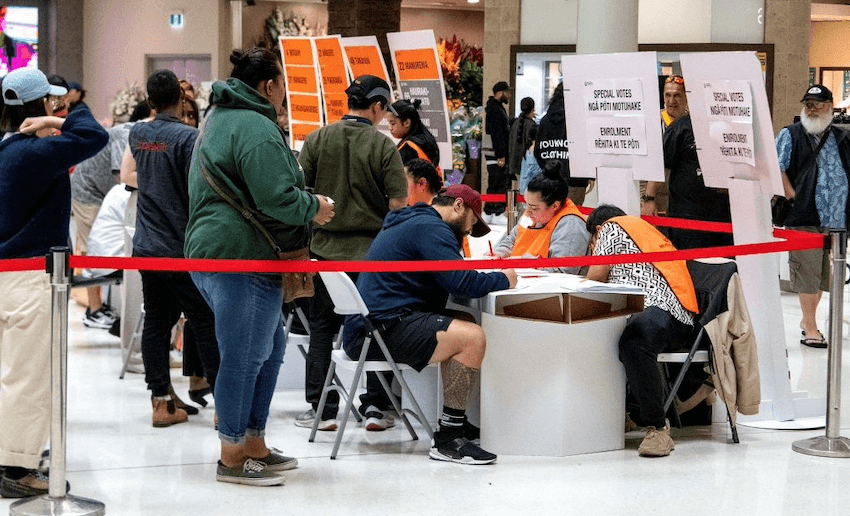It stems from a report that an election worker contacted a voter on social media, reports Stewart Sowman-Lund.
The Electoral Commission has taken action after it received a complaint of inappropriate behaviour by a polling booth worker ahead of last week’s election.
The complaint followed allegations shared to social media that a member of the public was found on Facebook by a polling booth staffer who helped them to enrol.
A spokesperson for the Electoral Commission told The Spinoff that it was “aware of a complaint from a voter that they were contacted on social media by an election worker after voting”. A later statement confirmed this was during the advance voting period and not on election day.
The individual raised the issue in a post on social media, seen by The Spinoff, in which they suggested the staff member had remembered their name from voting and intentionally sought them out. The Spinoff has chosen not to share the post.
Election workers have access to the electoral roll which includes contact information like full names, addresses and occupations. The details of most enrolled voters is public as the electoral roll is available to view at public libraries or the offices of registrars of electors, and printed copies can be purchased.
However, the commission’s website states that information collected during enrolment is only used for the purposes of elections and referenda, but that the personal information people provide can be given to other people and organisations “when the law requires it” and in line with the Electoral Act and the Privacy Act.
“We take people’s privacy very seriously,” the Electoral Commission told The Spinoff. “All staff, even if they are only working one or two days, sign a code of conduct outlining the standard of behaviour we expect.
“As soon as we were made aware of the complaint, we addressed the matter and took appropriate action.”
The Spinoff requested details relating to what “action” was taken by the commission. A spokesperson said that as this was an employment-related issue they could not provide further information. However, it was confirmed the individual was “no longer engaged by the commission for casual work”.
A police spokesperson told The Spinoff they were not aware of any complaints related to the incident.
At a briefing for media ahead of the election, chief electoral officer Karl Le Quesne told The Spinoff that roughly 22,000 people were needed to help run the election. All would go through a “robust” hiring process that involved interviews and police checks, he said.
“I have a lot of confidence that we have some really great people leading this process, we have some really great training and support for how it should run and then we’ve got a lot of eyes on this,” Le Quesne said in August.
“If people see anything that worries them or concerns them about the behaviour, we’ll be able to address it really quickly.”
The Electoral Commission has faced criticism over some aspects of this year’s election. Te Pāti Māori has called for an investigation into the commission, claiming voting stations ran out of forms. The commission has denied this.
A technical issue on election day was responsible for delays at polling stations, though the commission said anyone who turned up to vote would have been able to do so.
The commission has estimated that over 2.8 million people voted in this year’s election.





